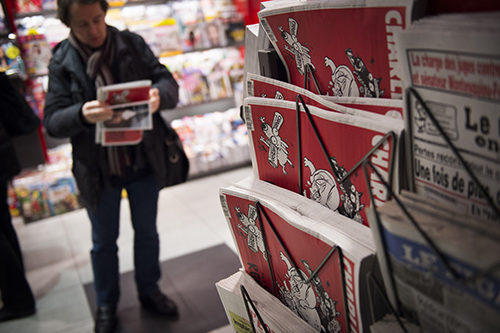Je suis Charlie. Two months after that phrase was used around the world to show solidarity with the victims of the January 7 attack against French satirical magazine Charlie Hebdo, flowers are still left at the site of the killings on Rue Nicolas Appert in the 11th arrondissement of Paris. The street has reopened to traffic but the magazine’s premises are still under police protection. The satirical weekly has not surrendered. Despite the deaths of its iconic cartoonists Charb, Wolinski, Cabu, and Tignous, it is back in the newsstands with its caustic tone intact.
The emotional wave of solidarity and indignation however, has largely subsided. Although still impressive when compared with its pre-attack run of 50,000 copies, the weekly’s print run is down from its historic high of eight million copies for the first edition after the attack, to 1.5 million last week, figures show. France has moved to other concerns: the economy, Ukraine, the electoral calendar. The National Front, which had been marginalized during the January 11 Je suis Charlie marches that its leaders told the press they had not been invited to, is back with a vengeance. The Paris attacks, followed by shootings at a free speech debate and a synagogue in Copenhagen last month, atrocities by the militant group Islamic State, and EU warnings on the number of “illegals” crossing the Mediterranean are feeding the populist, far-right narrative. Many opinion polls are pointing to a National Front surge at this month’s local elections, according to news reports.
The celebration of freedom of expression also seems less assured. After the Charlie Hebdo attack, publishers were reported to have rushed to put out copies of Voltaire’s 18th century Treatise on Tolerance. It is now on sale nearly everywhere in France, even in the most modest newsstands, but the overall climate has changed. The attacks have sown an atmosphere of fear and intimidation. Citing security concerns, a number of cultural centers and festivals have canceled or postponed public events devoted to freedom of expression or political cartooning. According to the daily Le Monde, cartoonists contacted by Charlie Hebdo about becoming contributors inquired whether they had to attend editorial meetings in the magazine’s offices or sign under their real name. “We have lost a battle. The terrorists have won,” former Charlie Hebdo editor and director Philippe Val, who left the magazine in 2009, told Swiss TV station RTS last month.
Despite calls from European leaders against stigmatizing the Muslim community, Islam appears to be on trial. According to a February survey of 1,500 French citizens commissioned by the research institute Cevipof, 56 per cent said “Islam is a threat to the Republic” and 69 per cent that “there are too many migrants.” Concerned by the fear of an anti-Islam backlash, mainstream religious leaders and public intellectuals are pleading for moderation and mutual understanding, according to the French press. Freedom of expression is “never unlimited,” they have said. It should be “tamed,” they suggested, in the name of other values such as coexistence and social harmony.
In the wake of the January 11 Paris demonstration, in which more than 3 million marched in solidarity with the victims of the magazine attack, the socialist government rejected any idea of a “French Patriot Act,” according to news reports. But, as the press pointed out, even before the attacks France had tough anti-terrorism laws. New laws are being proposed with the aim of cracking down on hate speech or incitement to terrorism, especially online, according to news reports. The French government is even bringing its campaign to European and international levels, and arguing for stricter control with U.S.-based Internet and social media behemoths.
Some voices have warned against overreacting. “It is not by repression that the essential value of the respect of the other will be restored,” Henri Leclerc, honorary president of the liberal French organization League of Human Rights, wrote in the current issue of Charlie Hebdo. “If you put an idea in jail you reinforce it.”
Despite the proposed measures implying increased surveillance powers, the government can count on strong majorities in parliament. Many legislators seem to be afraid of being seen as soft on terrorism or adding fuel to the fire. The public appears to agree: according to a recent nationwide Harris poll of 1,200 French citizens 77 percent were in favor of increased control of social media networks “even it means a restriction of civil liberties.” The Je suis Charlie moment is slowly fading away.
